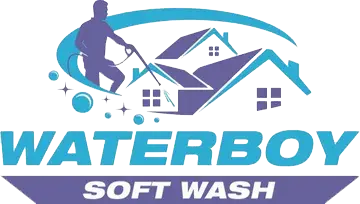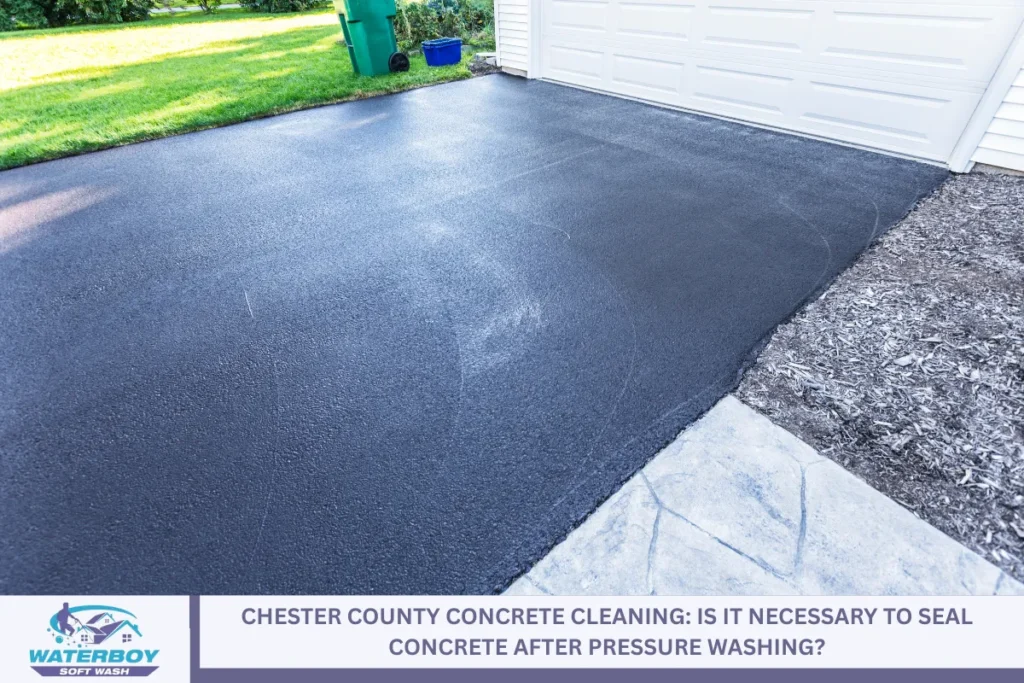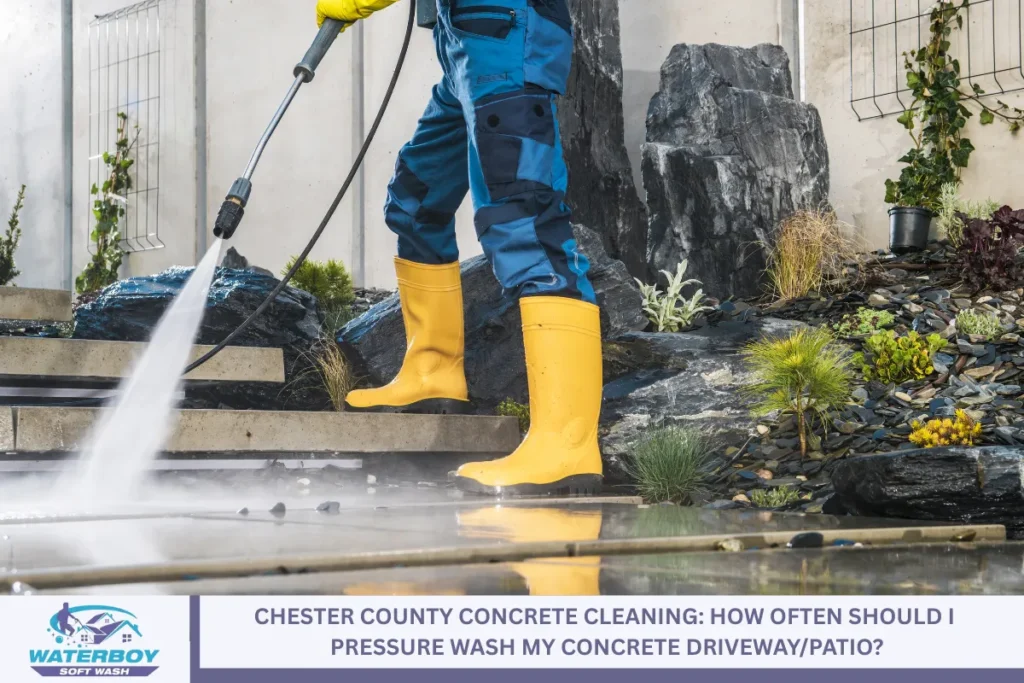Concrete cleaning is a critical step for preserving your driveway, sidewalk, patio, or pool deck—especially here in Chester County. But have you ever noticed that even after a great clean, your concrete can quickly lose its appeal and develop new stains or issues? That’s a common problem: even after thorough concrete cleaning, surfaces remain vulnerable to weather, moisture, oil, and even regrowth of algae or mold. Imagine spending hours and investing in pressure washing services only to see your beautiful surface start deteriorating again. The solution? Proper sealing right after cleaning locks in results, protects your investment, and keeps surfaces looking beautiful for years. Let’s explore why sealing is such an important step after concrete cleaning, how it works, and what every Chester County homeowner or property manager needs to know.
The Wide World of Concrete Surfaces in Chester County
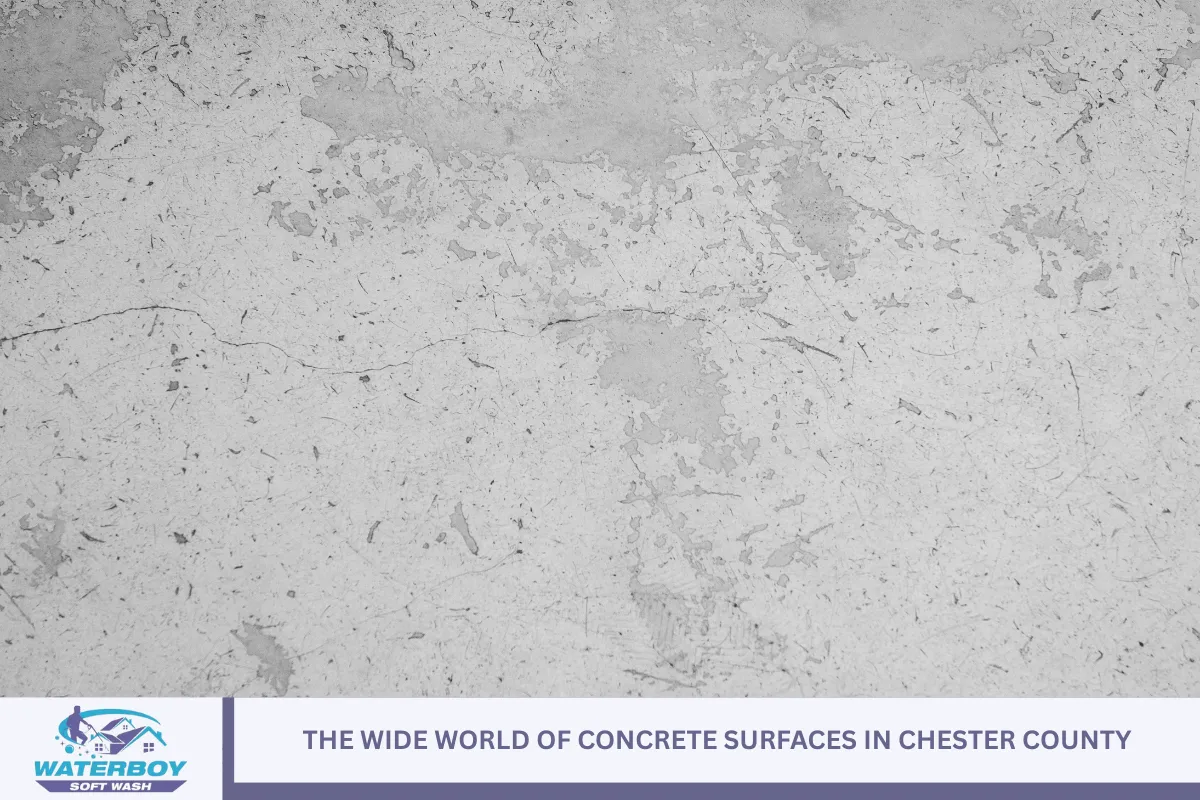
Concrete plays a huge role in almost every Chester County property. You’ll find concrete in driveways, sidewalks, patios, pavers, stamped concrete, garage floors, pool decks, and more. Each type comes with its unique look and function:
- Driveways & Sidewalks: High-traffic areas exposed to vehicles, foot traffic, tire marks, and oil drips.
- Patios & Pool Decks: Outdoor living spaces are vulnerable to moisture, UV rays, and organic growth.
- Stamped Concrete & Pavers: Decorative surfaces that show off curb appeal but are easily dulled by dirt, water, and weeds.
- Garage Floors: Prone to grease, oil stains, and salt-related damage, especially in Pennsylvania winters.
No matter the surface, Chester County’s mix of humidity, freeze-thaw cycles, and road salt in winter can be harsh on concrete. That’s where proper concrete cleaning and sealing make all the difference.
Concrete Cleaning: How Pressure Washing Services Tackle Tough Soils
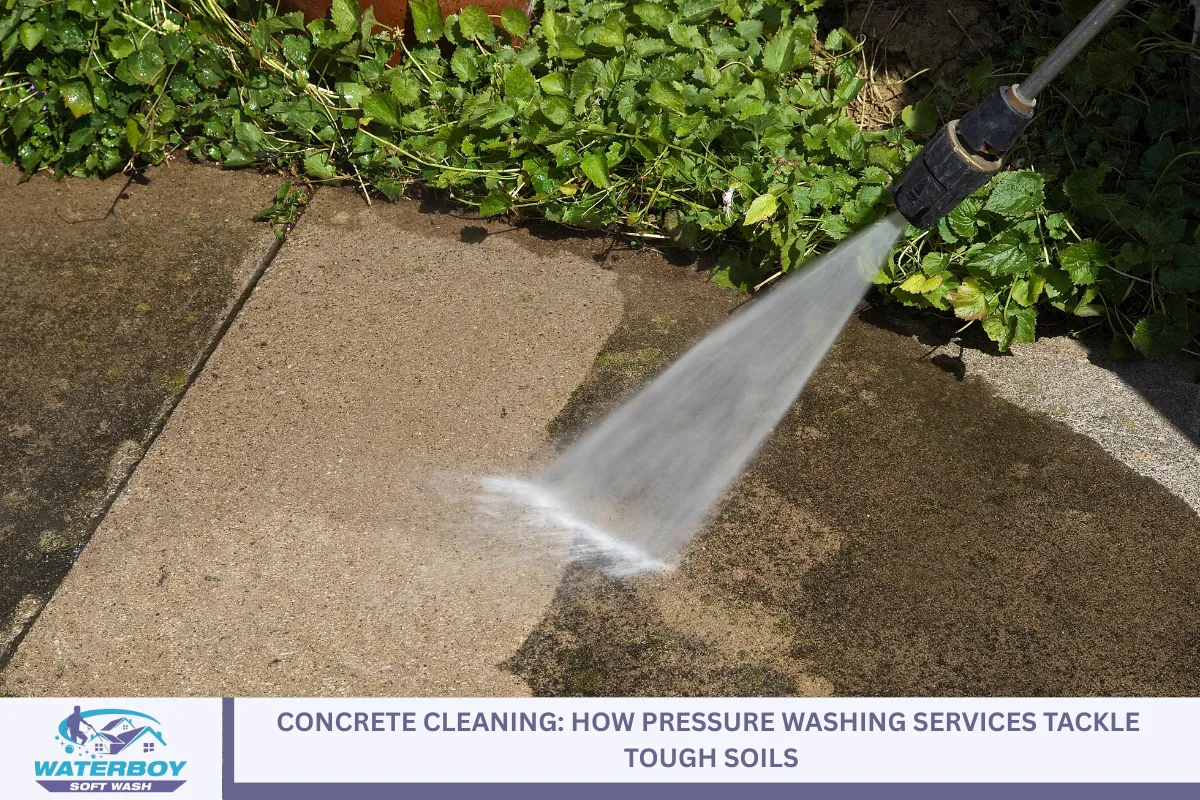
Professional concrete cleaning usually starts with a detailed assessment of the concrete surface to check for damage, weed growth, rust stains, and organic growth such as moss or algae. This initial inspection ensures the appropriate cleaning approach and that the process will not harm any part of the surface.
Pressure Washing Techniques and Tools
Pressure washing (also called power washing) lifts away stubborn dirt, oil stains, and weeds. Pros use pressure washing machines with various nozzles, wands, and even turbo nozzles to cover broad areas or clean tough spots with detail. High-quality cleaning equipment, such as surface cleaners (which look like flat discs), cleans evenly and helps prevent ugly “stripe” marks or etching.
- Hot vs. Cold Water: For oily areas or greasy garage floors, hot water pressure washing provides better results.
- PSI Pressure Washers: For most concrete surfaces, a PSI (pounds per square inch) between 2,500-3,500 and 3-5 GPM (gallons per minute) is ideal.
- Nozzle Selection: Fan tips reduce concentrated pressure to avoid surface damage, while rotary or turbo nozzles help with deep stains.
Cleaning Solutions
Professional pressure washing services in Chester County use a mix of eco-friendly and powerful chemicals:
- Degreaser: For oil and fat-based stains, especially driveways and garage floors.
- Sodium Hypochlorite (Bleach): For organic growth like mold, mildew, and algae.
- Surfactants/Detergent: Help lift dirt and prevent it from settling back.
- Rust Remover & Oxalic Acid: Treat rust stains and some forms of efflorescence.
- Polymeric Sand: Replaces lost joint sand between pavers to block weeds and stabilize joints.
- Eco-Friendly Solutions: Important for pool decks and areas near gardens or storm drains.
A pre-treatment step with cleaners breaks down tough spots; after high-pressure washing, a post-treatment may be needed to prevent algae. Careful rinsing keeps surfaces free from leftover chemicals.
The Case for Sealing: Is It Necessary After Concrete Cleaning?
Why Seal Concrete Surfaces?
After pressure washing, your concrete’s pores are wide open, making it vulnerable to water, oils, dirt, freeze-thaw cycles, and UV rays. Sealing locks out these threats and keeps your concrete looking vibrant and clean for longer.
Major benefits of sealing:
- Long-Term Protection: Shields against water, oil, salt, and stains.
- Prevents Surface Damage: Blocks moisture that causes freeze-thaw cracking, scaling, spalling, and pitting.
- Stops Mold, Algae, and Weed Growth: Keeps organic growth from coming back.
- Enhances Appearance: Deepens color, adds gloss or “wet look” if desired, boosts curb appeal.
- Easier Maintenance: Sweeping and washing are simpler because dirt can’t embed itself.
Is Sealing Required After Pressure Washing?
While not “required” by local law, sealing is highly recommended—especially in Pennsylvania, where de-icing salts and rain create harsh conditions. Unsealed surfaces quickly reabsorb grime and are prone to moisture damage soon after cleaning. The best time to apply a sealer is right after pressure washing, but only after the concrete is thoroughly dry.
Understanding Concrete Sealer Types: Penetrating vs. Film-Forming
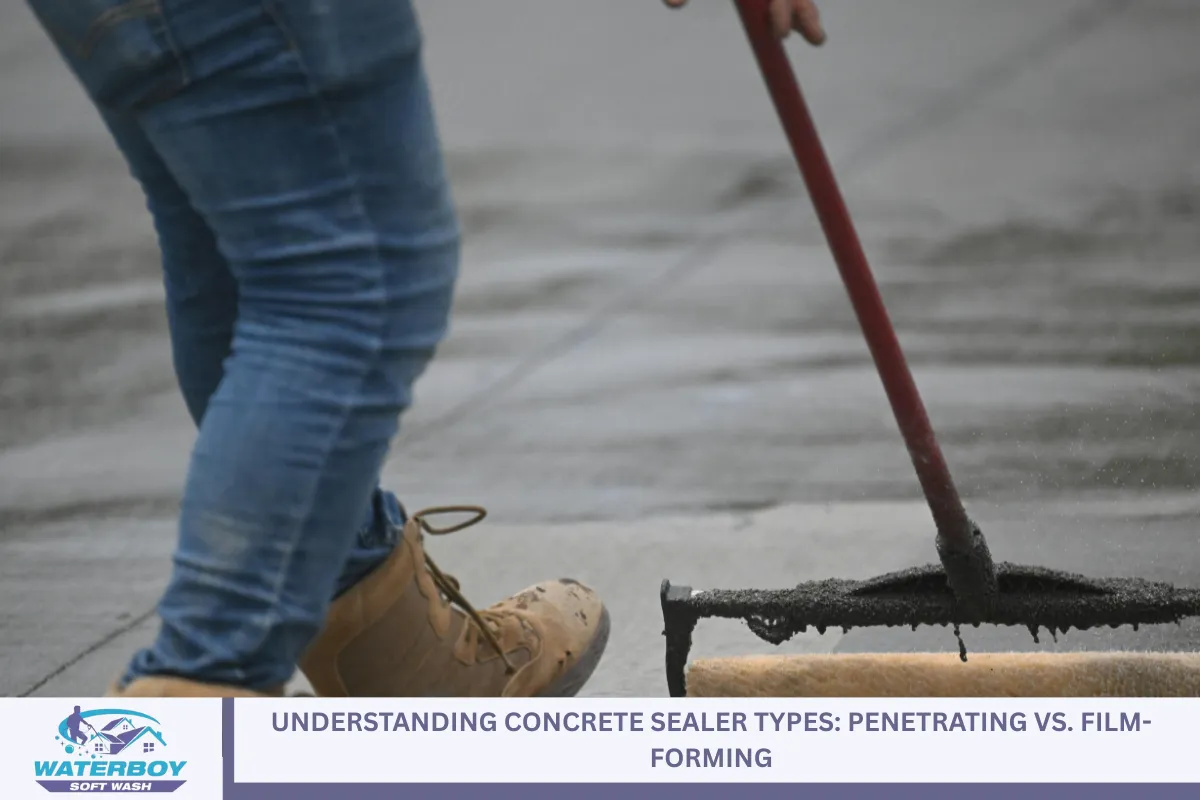
Choosing the right sealer can feel overwhelming. Here’s what you need to know:
Penetrating Sealers
- Chemistry: Silane, siloxane, siliconate.
- Look: Invisible—does not change color or sheen.
- Performance: Absorbs into concrete, forms a barrier against water, salts, chlorides, and freeze-thaw damage.
- Best for: Driveways, sidewalks, pavers, and stamped concrete in freeze-thaw areas; areas exposed to de-icing salts.
Film-Forming Sealers
- Chemistry: Acrylic, epoxy, polyurethane.
- Look: Adds sheen, ‘wet look,’ satin, gloss, or matte finish.
- Performance: Creates a surface film to repel moisture and enhance color.
- Best for: Decorative surfaces (patios, stamped concrete) where appearance is priority.
Water-Based vs. Solvent-Based Sealers
- Water-Based: Lower odor, easier cleanup, VOC-compliant, more breathable (lets moisture escape).
- Solvent-Based: Can deepen color and make it glossier, but may be less breathable (traps moisture if applied to damp concrete).
For most Chester County cleaning and sealing jobs, water-based, breathable sealers are a safe, eco-friendly bet, but always match your choice to the surface and conditions.
The Right Timing: Surface Prep, Drying, and When to Apply Sealer
Prep Steps Before Sealing
- Thorough Cleaning: Remove all stains, weed growth, efflorescence, and contaminants using pressure washing and eco-friendly solutions.
- Joint Sand: Replace lost polymeric sand between pavers to stabilize joints and prevent future washout.
- Drying: Concrete must be bone dry before sealing. Wait at least 24-48 hours after pressure washing, longer in humid or cool weather. Conduct a simple moisture test (tape down a square of plastic; check for condensation).
Application Best Practices
- Surface Temperature: Best between 50-80°F.
- Weather: No rain for at least 24 hours after sealing.
- Methods: Use a roller, pump-up sprayer, or, for large jobs, an airless sprayer.
- Even Application: Avoid streaks, etching, or wand marks by overlapping sections and avoiding overworking.
- Anti-Slip Additive: For pool decks or steep driveways, mix in for safer walking.
Cure Time
- Most sealers dry to the touch in 1 hour but reach full strength in 24-48 hours. Vehicles should stay off for at least 48 hours.
Maintenance, Lifespan, and Resealing Scheduling
- Sealer Lifespan: Most sealers last 2-3 years under normal wear and tear. High-traffic driveways or pool decks may need more frequent re-sealing.
- Seasonal Inspection: Check every spring and fall for loss of water beading, stains, or color fade.
- Maintenance: Reseal as soon as you notice diminished protection; don’t let problems compound.
DIY vs. Professional Pressure Washing & Sealing in Chester County
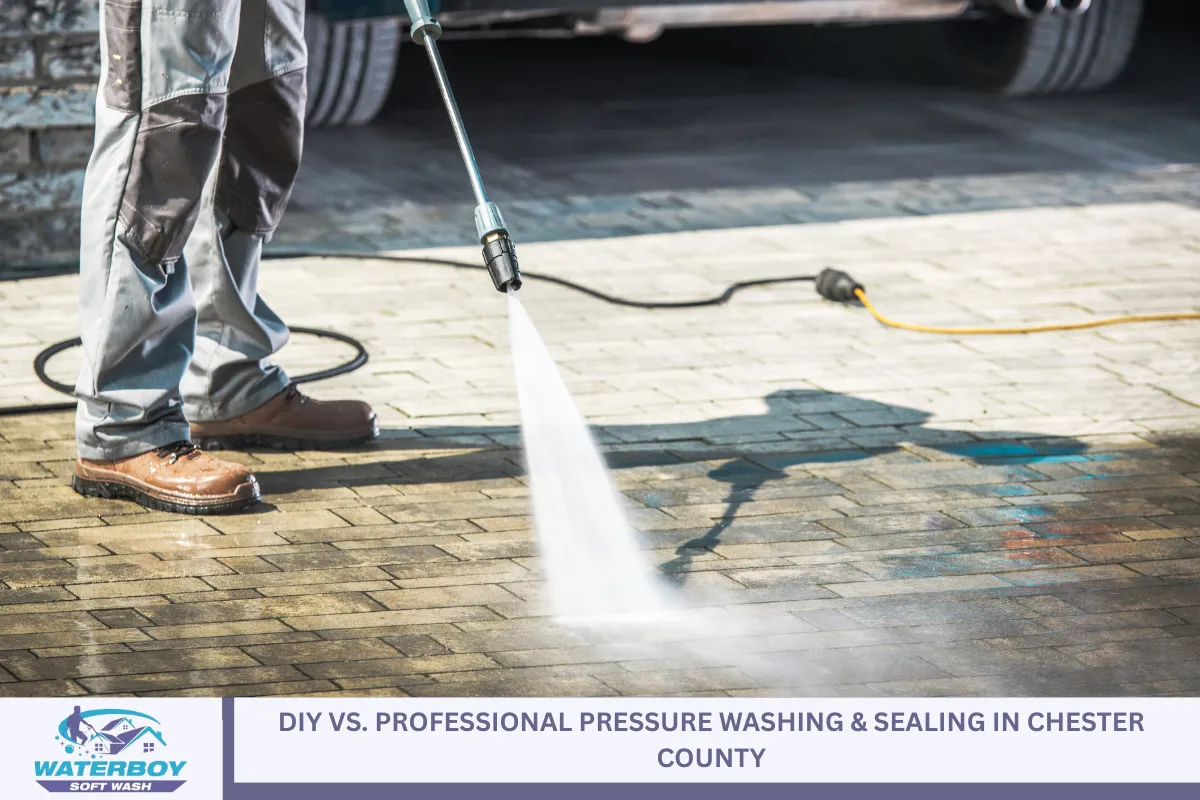
Professional Service Benefits
- High-Quality Cleaning Equipment: Contractors use PSI pressure washers, surface cleaner discs, and eco-friendly solutions to achieve better results with less risk of surface damage.
- Expertise: Experienced pros know how to avoid etching and streaks, and they choose the right products for your surface.
- Licensed, Insured, Warranty: Most reputable companies offer free estimates, clear pricing for pressure washing, and warranty coverage for peace of mind.
Cost and Pricing
- Cost to Pressure Wash and Seal: In Chester County, base costs to pressure wash and seal an average driveway range from $0.75 to $2.00 per square foot, varying with condition, surface type, and sealer used.
- DIY: Homeowners can rent pressure-washing equipment, but must be careful with water pressure, nozzle selection, and sealer selection to avoid damage.
Enhanced Property Value and Curb Appeal
Beyond preventing future surface damage, proper concrete cleaning and sealing boost your home’s curb appeal—important for HOA standards and property value. When done right, concrete surfaces look brighter, colors pop, and future stains can be washed away far more easily.
What to Watch Out For: Common Issues and Mistakes
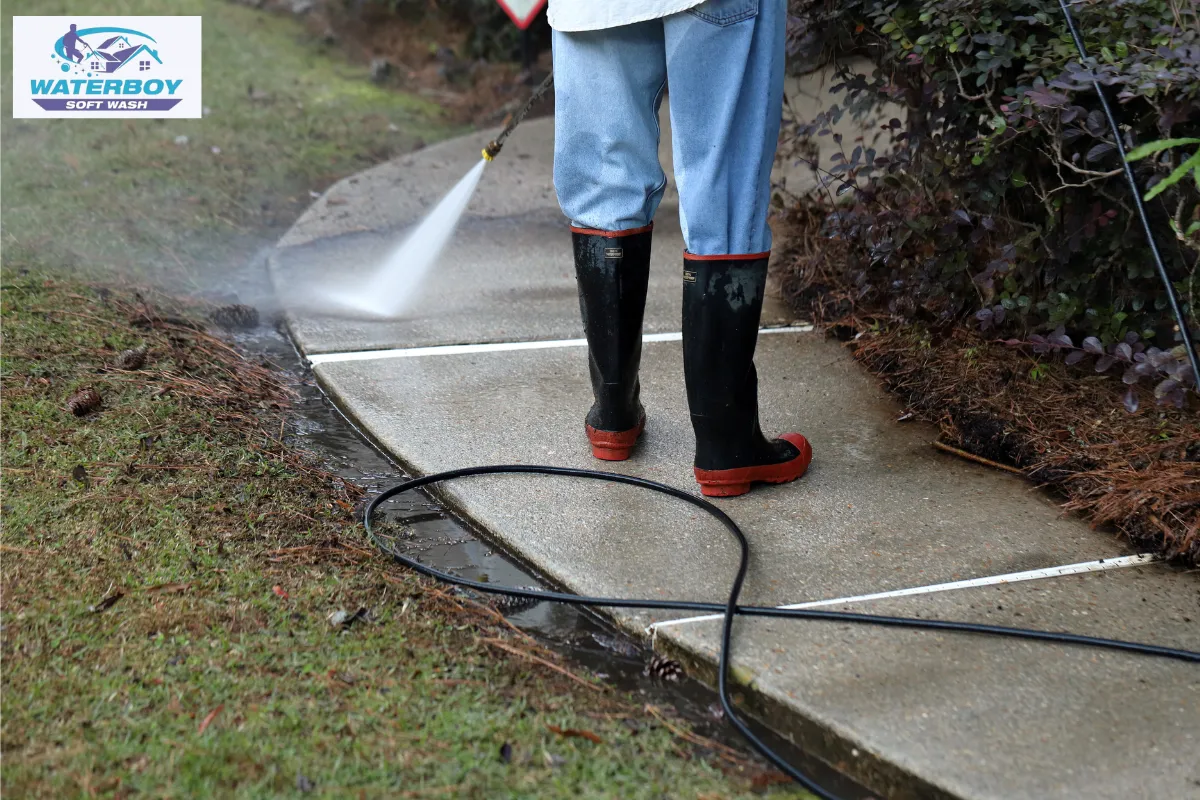
- Not Allowing Enough Drying Time: Sealer can trap moisture, causing hazing or peeling.
- Using the Wrong Sealer: An incompatible sealer can peel or fail to protect.
- High-Pressure Damage: Excessive pressure or the wrong nozzle can cause etching or striping.
- Ignoring Weather Conditions: Rain or surface condensation ruins the sealing process.
Real Success Stories: What Local Homeowners Experience
Many Chester County residents are amazed at how a cleaned and sealed driveway or patio transforms their entire exterior space. Homeowners appreciate easy maintenance, resistance to oil stains, and the boost in curb appeal, especially when paired with paver sealing or stamped concrete restoration.
Chester County Concrete Cleaning – Water Boy Soft Wash
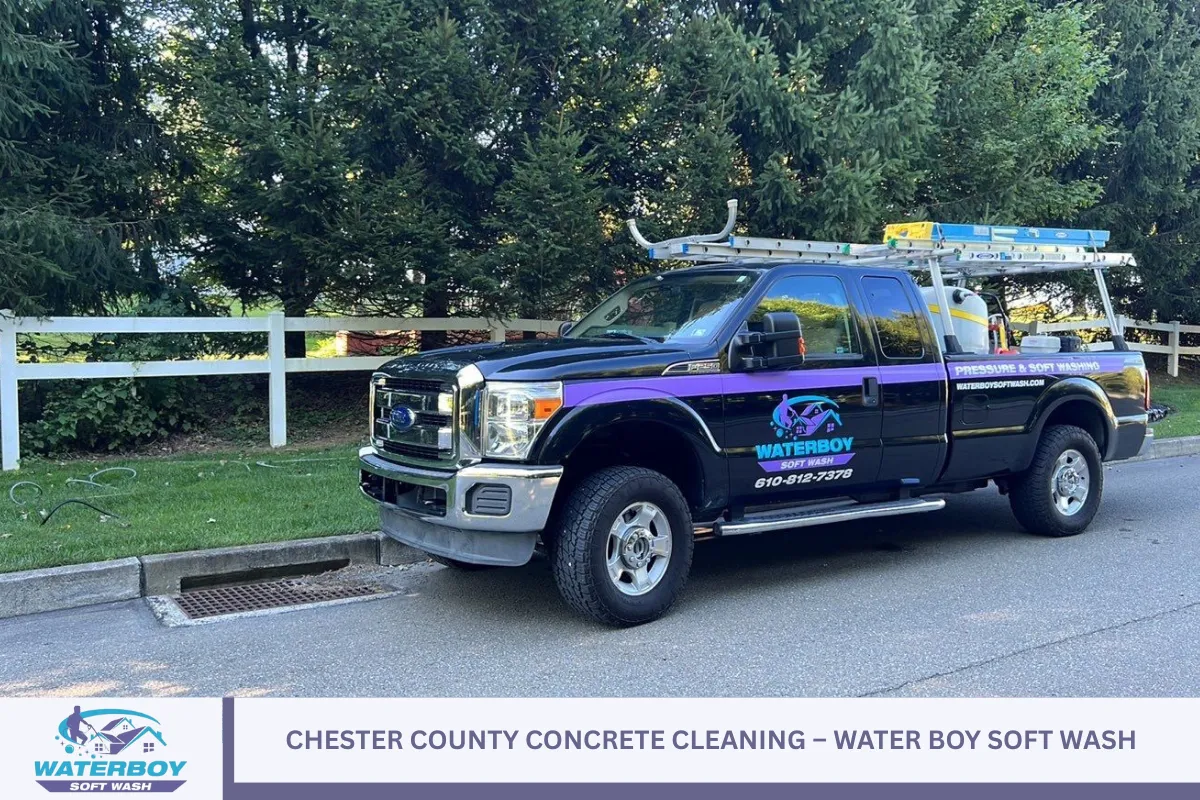
Concrete cleaning is just the first step—long-lasting protection comes from sealing! At Water Boy Soft Wash, we understand that Chester County’s weather can quickly turn those beautifully cleaned driveways, patios, or sidewalks into stained, worn, and unsightly surfaces. That’s why our professional concrete cleaning service always recommends sealing right after pressure washing. Sealing safeguards your concrete from oil, water, mold, and freeze-thaw damage, keeping it looking fresh and clean longer.
Call us today at (610) 812-7378 to schedule a consultation and revitalize your concrete!
Frequently Asked Questions (FAQ)
1. Do all pressure washing companies offer concrete sealing after cleaning?
Not all pressure washing companies include sealing as part of their concrete cleaning services. Some specialize solely in cleaning, while others offer comprehensive packages that include both cleaning and sealing. It’s important to ask your chosen provider about their service offerings and whether sealing is included or can be added as an option. In Chester County, many reputable companies recommend sealing as an essential follow-up to cleaning, due to the region’s freeze-thaw cycles, de-icing salt exposure, and frequent wet weather. Always request a detailed quote to ensure that both cleaning and sealing are covered according to your needs.
2. What should I expect from a professional estimate for concrete cleaning and sealing?
A professional estimate for concrete cleaning and sealing should include an initial inspection, details on the type of cleaning equipment and chemicals to be used, square footage pricing, and a timeline for surface preparation, cleaning, and sealing. It should also outline drying and curing times, the recommended sealer type, and whether a warranty is included. In Chester County, you should expect the estimate to address local weather conditions and specific concerns, such as de-icing salts or organic staining. Always make sure your contractor is licensed and insured, and check customer references or before-and-after photos for quality assurance.
3. Can I use a pressure washer from a big box store for concrete cleaning?
You can use a consumer pressure washer for basic concrete cleaning, but results may be less consistent than with professional-grade cleaning equipment. Store-bought models often have lower PSI and less effective surface cleaners, making it harder to remove tough oil, rust, or organic stains. There’s also a higher risk of streaks or surface damage if you use too much pressure or the wrong nozzle. If you do tackle it yourself, research pressure washing techniques carefully, pre-treat stains, choose the right nozzle, and always follow up with the proper sealer for long-term protection.
4. What is the difference between efflorescence, scaling, and spalling on concrete surfaces?
Efflorescence refers to a white, powdery residue—often salts—migrating to the surface of your concrete, usually due to water movement. Scaling occurs when the surface layer of concrete flakes or peels off, typically due to freeze-thaw cycles or improper sealing. Spalling is the breaking, chipping, or pitting of concrete, often caused by moisture penetration and salt-related damage. All three issues are more likely to occur in unsealed or poorly maintained concrete, especially in climates like Chester County. Proper cleaning, sealing, and regular maintenance are key to preventing these problems.
5. Will sealing help prevent new weeds from growing in my paver joints?
Yes, sealing—especially after replacing or stabilizing joint sand with polymeric sand—effectively locks the sand in place, making it much harder for weeds to sprout or take root. Paver sealing not only stabilizes the joint sand but also creates a water-resistant barrier, reducing the chance of seeds germinating in the joints. For best results, pressure wash thoroughly, remove all existing weeds and debris, allow to dry, replace joint sand, and then apply an appropriate sealer. This approach ensures maximum weed prevention and preserves your paver surface’s appearance for much longer.
Read more: Chester County Concrete Cleaning: How Often Should I Pressure Wash My Concrete Driveway/Patio?
